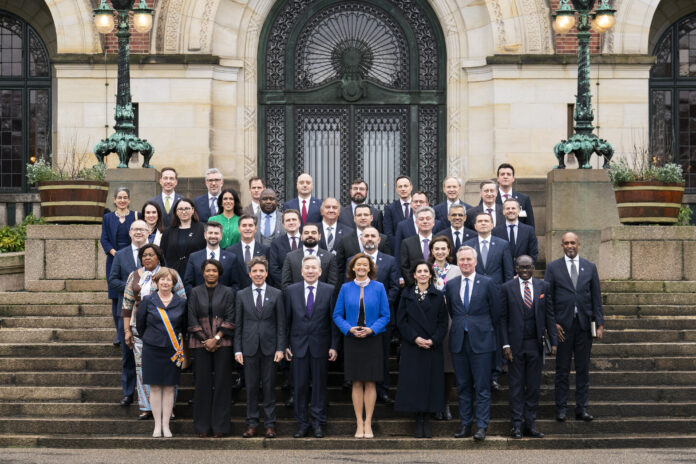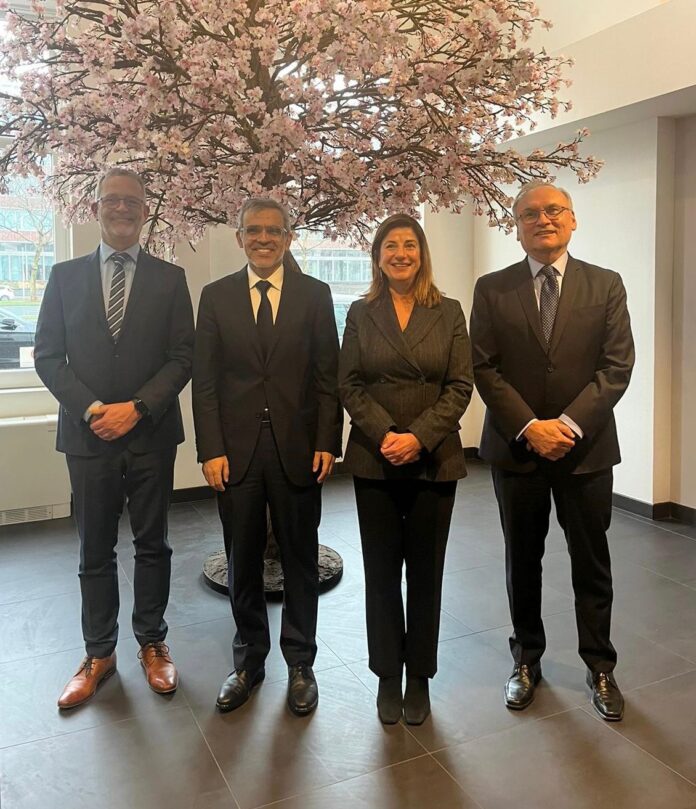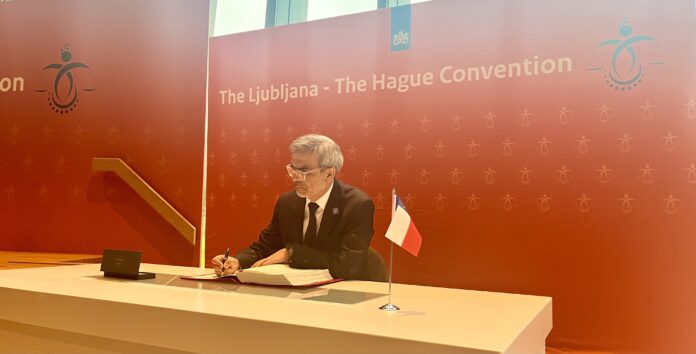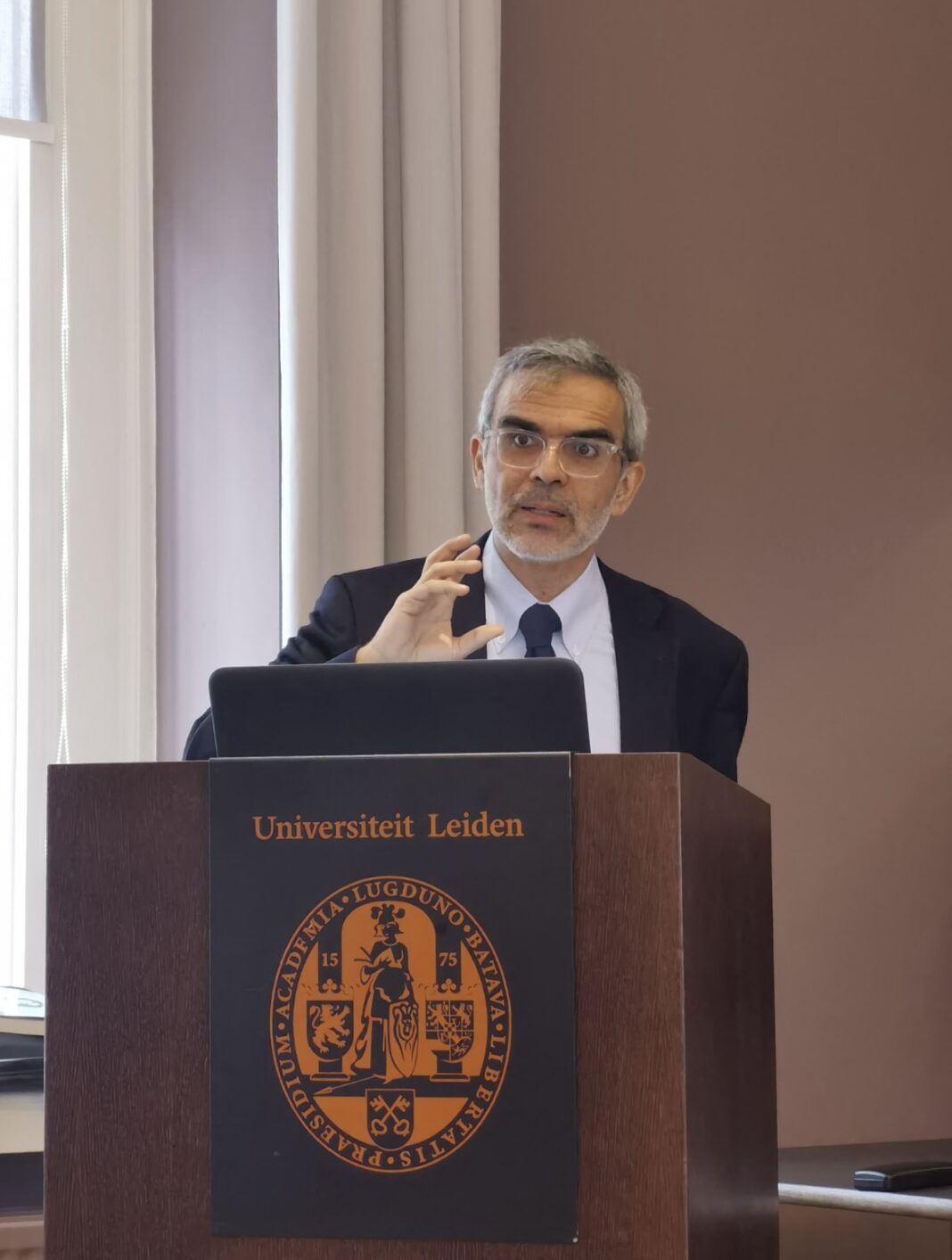Advances in international cooperation with the implementation of the National Search Plan
Between February 13 and 17, the Minister of Justice and Human Rights of Chile, Luis Cordero Vega, representing President Gabriel Boric Font, visited the Netherlands, during which he had an important agenda of meetings and activities.
The main instance considered the signing of the Ljubljana – The Hague Convention on International Cooperation in the Investigation and Prosecution of the Crime of Genocide, Crimes against Humanity and War Crimes. In addition to that, he held meetings with high authorities of international organizations and the government of the Netherlands and closed with a keynote talk on the National Search Plan (PNB) at the University of Leiden.
In the presentation, the minister addressed the relevance of the PNB, as a fundamental pillar in Chile’s human rights policy, an event attended by academics, students, diplomats, and representatives of international organizations.

He noted that: “it represents the most significant effort in the area of human rights in Chile, bringing together institutions and experts in a large-scale multidisciplinary task”, highlighting the inter-institutional effort deployed by the State of Chile to clarify the circumstances of disappearance and/or death of victims of forced disappearance.
Meetings and bilateral meetings
During his time in The Hague, the ministerial agenda included a meeting with Kathryne Bomberger, Director General of the International Commission on Missing Persons (ICMP), a space where collaborations with the National Search Plan were addressed, specifically, with the Servicio Médico Legal (Legal Medical Service), in areas of unification of missing person’s data and the implementation of advanced forensic technologies.

In his meeting with the Director General of International Cooperation of the Ministry of Foreign Affairs, Ms. Pascalle Grotenhuis, key issues regarding access to justice and the fight against transnational organized crime were discussed, reinforcing bilateral ties and exploring areas of possible work collaborations.
International Criminal Court ICC
On his state tour to the headquarters of the Dutch government, the national authority met with representatives of the International Criminal Court (ICC) headed by the President of the Court, Judge Piotr Hofmański, a space that was used to discuss issues such as strengthening commitment of Chile with the Court, judicial cooperation and Chile’s support for the policies of the ICC Prosecutor’s Office on childhood and gender crimes.
Added to this were the advances in the implementation of the Rome Statute and its amendments, and the cooperation and complementarity between the ICC and national justice systems. The meeting highlighted Chile’s commitment to multilateralism, international law and justice, and the peaceful resolution of controversies, aligning with Chile’s foreign policy priorities that promote human rights, especially in the relationship with children and women.

Signing of the Ljubljana – The Hague Convention
As part of his visit, the Minister of Justice and Human Rights, Luis Cordero, representing the President of the Republic, Gabriel Boric Font, attended the signing of the Ljubljana – The Hague Convention, which represents an important advance in the fight against impunity and the protection of human rights at a global level.
The Ljubljana – Hague Convention is the result of more than a decade of negotiations, establishing a crucial framework for the investigation and prosecution of crimes of genocide, crimes against humanity, war and other international crimes, marking a milestone in the global effort to eradicate impunity and safeguard human rights worldwide.
“After 25 years of the last Convention signed for the prosecution of these crimes, which was the creation of the International Criminal Court, a Convention was signed again that was discussed for more than 10 years and whose purpose is to ensure that States are effective in the investigation and above all in the protection of victims of crimes against humanity. For Chile, it is not only a responsibility to have signed it, but it is within the context of the investigation of these crimes and its policy regarding reparation for crimes of the dictatorship,” said Minister Luis Cordero.
The Ljubljana – The Hague Convention, adopted in Slovenia and signed in the Netherlands, seeks to intensify cooperation between nations for the prosecution of the most serious crimes that affect humanity. Chile, already committed from its early stages as a signatory to the “MLA-Initiative”, played a crucial role in drafting the treaty, along with countries such as the Netherlands, Canada, Slovenia and the Democratic Republic of the Congo. This convention not only clearly defines international crimes, but also establishes a framework for cooperation between States for their investigation and prosecution.



